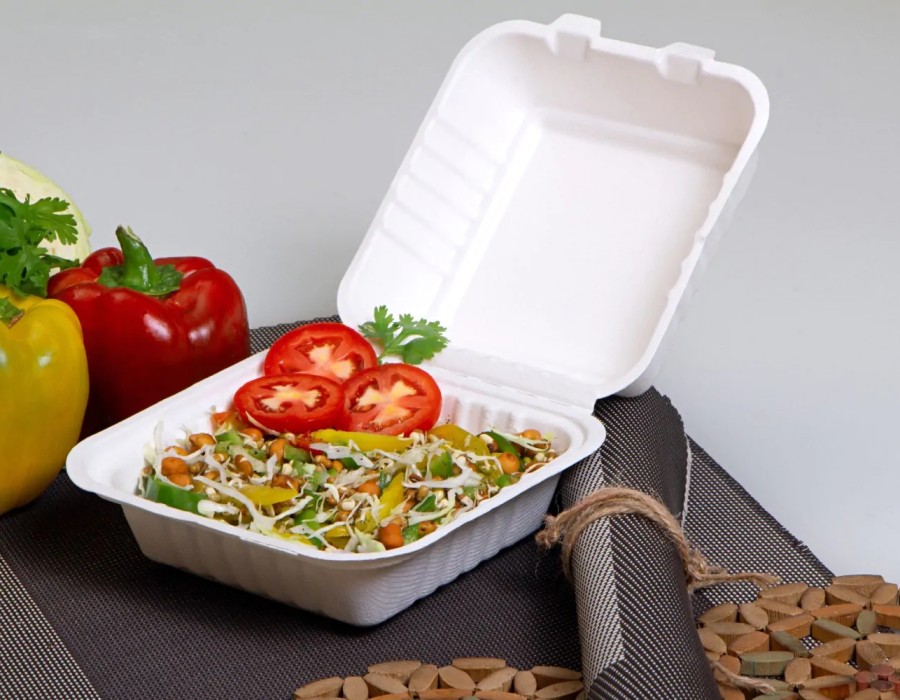As businesses and consumers increasingly prioritize sustainability, eco-friendly packaging options like sugarcane food containers are gaining widespread attention. These containers, made from the fibrous residue left after sugarcane juice extraction, offer a biodegradable and compostable alternative to traditional plastic. In this blog, we’ll explore the sustainability of sugarcane food containers and why they are an excellent choice for businesses looking to reduce their environmental impact.
What Makes Sugarcane Food Containers Sustainable?
Sugarcane food containers are crafted from bagasse, the fibrous material that remains after the sugarcane is pressed for juice. Instead of being discarded as waste, this byproduct is transformed into durable, compostable packaging, reducing agricultural waste and the need for virgin materials.
Renewable Resource
One of the key sustainability features of sugarcane food containers is that sugarcane itself is a rapidly renewable resource. It proliferates, and using bagasse ensures that no part of the plant goes to waste. This contrasts sharply with plastic, which is derived from petroleum, a non-renewable fossil fuel.
Biodegradability and Compostability
Sugarcane containers are fully biodegradable and compostable, meaning they break down naturally into organic matter without releasing harmful toxins or microplastics. In industrial composting facilities, these containers can decompose within 30-90 days, leaving behind no harmful residues. For businesses aiming to reduce their environmental footprint, this makes sugarcane containers a responsible alternative to traditional plastic.
Lower Carbon Footprint
Compared to plastic production, which involves significant energy and fossil fuel consumption, the manufacturing of sugarcane food containers results in a much lower carbon footprint. The conversion of bagasse into packaging requires less energy, and because sugarcane absorbs CO2 as it grows, it helps offset emissions during production.
Benefits for Businesses
Choosing sugarcane food containers for your business not only aligns with eco-conscious values but also offers practical benefits that can positively impact both operations and customer satisfaction.
Customer Appeal
Consumers are increasingly seeking out businesses that prioritize sustainability. By using eco-friendly packaging like sugarcane containers, you’re sending a clear message that your brand cares about the environment. This can increase customer loyalty and attract eco-conscious consumers, boosting your brand image in the competitive marketplace.
Versatility in Use
Sugarcane food containers are versatile and can be used for a wide range of food types, both hot and cold. They are microwaveable and freezer-safe, offering practical benefits for businesses in the food service industry. Their durability means they won’t break down or warp under the strain of hot foods, making them an excellent option for takeout, delivery, and catering services.
Cost-Effective in the Long Term
While biodegradable packaging may come with a slightly higher upfront cost than plastic, sugarcane food containers are often seen as a long-term investment. They align with the growing global push towards sustainability, helping your business stay ahead of regulatory changes aimed at reducing plastic waste. Additionally, as more consumers support eco-friendly brands, this investment can pay off through increased sales and customer loyalty.
Environmental Impact of Switching to Sugarcane Containers
The switch to sugarcane food containers helps reduce the volume of plastic waste ending up in landfills and oceans. Plastic waste is one of the most pressing environmental issues today, with millions of tons of plastic polluting natural ecosystems each year. Sugarcane containers, on the other hand, degrade naturally, offering a sustainable alternative that doesn’t contribute to long-term waste.
Reducing Landfill Waste
Plastic containers can take hundreds of years to degrade in landfills, leaching harmful chemicals into the soil and water. Sugarcane containers, being compostable, help divert waste from landfills, reducing the burden on our waste management systems.
Minimizing Ocean Pollution
Plastic waste is a significant contributor to ocean pollution, harming marine life and ecosystems. By switching to biodegradable sugarcane containers, businesses can help curb the flow of plastic into our oceans, supporting global efforts to protect marine biodiversity.
Conclusion
As businesses continue to move toward more sustainable practices, sugarcane food containers present a smart, eco-friendly packaging option. Their biodegradability, renewable source material, and lower carbon footprint make them a superior alternative to plastic containers, all while helping businesses reduce waste and align with consumer preferences for green products.
Choosing sugarcane food containers not only benefits the environment but also positions your business as a leader in sustainability, offering both ecological and competitive advantages in today’s marketplace.





Comments